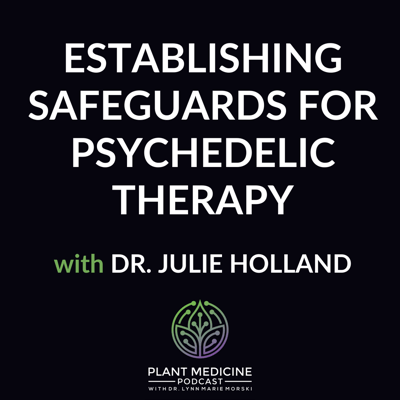Establishing Safeguards for Psychedelic Therapy with Dr. Julie Holland
- 27
- 04/28/2021

Summary
This episode of the Plant Medicine Podcast is the final installment in a three-part series with Dr. Julie Holland. Dr. Holland is a psychiatrist specializing in psychopharmacology, and she is also the author of many books, including her most recent work Good Chemistry: The Science of Connection, from Soul to Psychedelics which discusses the neurochemistry behind human connection. She is also a medical monitor for several MAPS PTSD studies using MDMA-assisted psychotherapy and has worked for decades on US drug policy reform based on harm reduction principles. In addition to this work, Dr. Holland has nine years experience running a psychiatric emergency room as an attending physician on the faculty of NYU school of medicine and she continues her psychiatric work in her private practice in New York City.
In this episode, Dr. Holland speculates on the future of psychedelic therapy and the emerging issues within the broader psychedelic movement. Lamenting the lack of governing organizations and accountability, Dr. Holland discusses the complexities of regulating an industry with a history of operating underground and in legal grey areas. This raises questions such as how to grandfather-in established psychedelic practitioners now that various coursework in psychedelic therapy and systems for credentials are beginning to emerge.
Another issue related to legality which Dr. Holland discusses is the relation between the medical establishment and psychedelic therapies. The fact that individuals interested in pursuing plant medicines for therapeutic reasons are not able to easily consult with primary care doctors is a huge hurdle to harm reduction, and, as Dr. Holland points out, this leaves the responsibility for ensuring safety entirely on the psychedelic practitioners. Because these practitioners range from underground ayahuasca circles to clinically approved, legally operating therapists the amount of attention and care paid to harm reduction can vary greatly, which is why it will be essential to establish standards and best practices for psychedelic therapy as demand continues to increase.
Dr. Holland also discusses the issues of “psychedelic capitalism” which are coming to the fore as these treatments become more mainstream and more accessible. While there are no clear answers for how to navigate the intersection of psychedelic therapies and capitalist market dynamics, this is an issue that deserves care and attention so that there can be equitable access to these medicines. Dr. Holland closes with a discussion of the parasympathetic nervous system–the “rest and digest” mode–and its importance for not only personal health, but also social well-being.
In this episode, Dr. Holland speculates on the future of psychedelic therapy and the emerging issues within the broader psychedelic movement. Lamenting the lack of governing organizations and accountability, Dr. Holland discusses the complexities of regulating an industry with a history of operating underground and in legal grey areas. This raises questions such as how to grandfather-in established psychedelic practitioners now that various coursework in psychedelic therapy and systems for credentials are beginning to emerge.
Another issue related to legality which Dr. Holland discusses is the relation between the medical establishment and psychedelic therapies. The fact that individuals interested in pursuing plant medicines for therapeutic reasons are not able to easily consult with primary care doctors is a huge hurdle to harm reduction, and, as Dr. Holland points out, this leaves the responsibility for ensuring safety entirely on the psychedelic practitioners. Because these practitioners range from underground ayahuasca circles to clinically approved, legally operating therapists the amount of attention and care paid to harm reduction can vary greatly, which is why it will be essential to establish standards and best practices for psychedelic therapy as demand continues to increase.
Dr. Holland also discusses the issues of “psychedelic capitalism” which are coming to the fore as these treatments become more mainstream and more accessible. While there are no clear answers for how to navigate the intersection of psychedelic therapies and capitalist market dynamics, this is an issue that deserves care and attention so that there can be equitable access to these medicines. Dr. Holland closes with a discussion of the parasympathetic nervous system–the “rest and digest” mode–and its importance for not only personal health, but also social well-being.
In This Episode
• Why it is essential to begin establishing best practices and safeguards around emerging psychedelic therapies and other practices involving plant medicines
• Issues that arise from the intersection of capitalist market dynamics and the emerging psychedelic industry
• The future of medical consultations prior to consuming plant medicines
• Activating the parasympathetic nervous system and its pro-social impacts
Quotes
“I think part of it is just this fear that if we admit there are some bad actors, that the whole house of cards is gonna fall.” [9:26]
“Just because of the way capitalism is, there is IP, there is proprietary information, there is anti-competitive behavior. That to me also really needs to be addressed.” [11:31]
“In any interaction there is a choice of being hurtful or helpful, and it’s a choice, everyday.” [20:18]
“Anyone who can out themselves should, because it will move this whole thing along a lot more. If you are a soccer mom who also microdoses, put that bumper sticker on your car.” [24:58]
“Just because of the way capitalism is, there is IP, there is proprietary information, there is anti-competitive behavior. That to me also really needs to be addressed.” [11:31]
“In any interaction there is a choice of being hurtful or helpful, and it’s a choice, everyday.” [20:18]
“Anyone who can out themselves should, because it will move this whole thing along a lot more. If you are a soccer mom who also microdoses, put that bumper sticker on your car.” [24:58]
Links
* The Psychedelic Medicine Podcast has allowed the Psychedelic Medicine Association to post episodes as an educational resource, and in return the PMA is hosting the podcast show notes.


